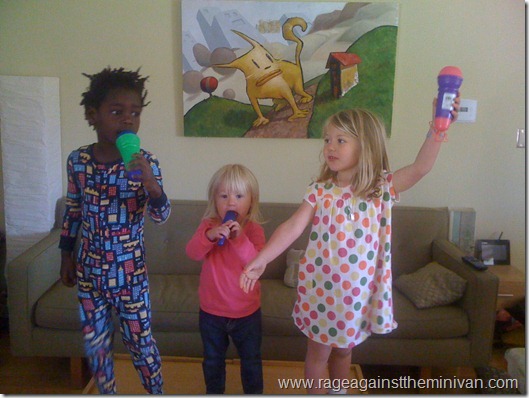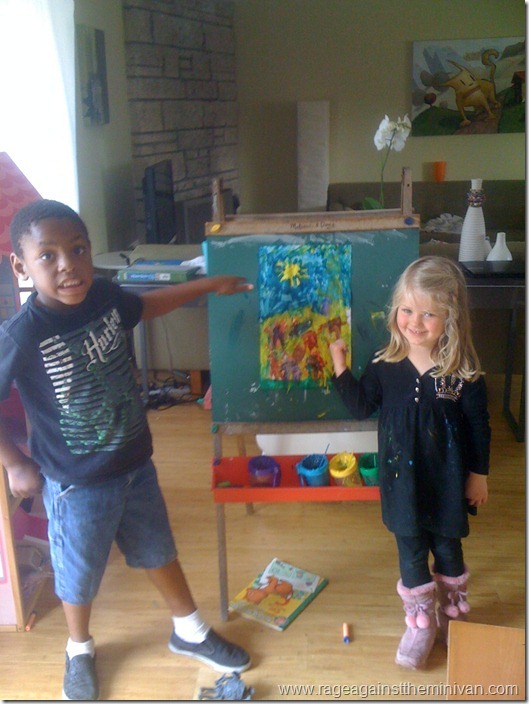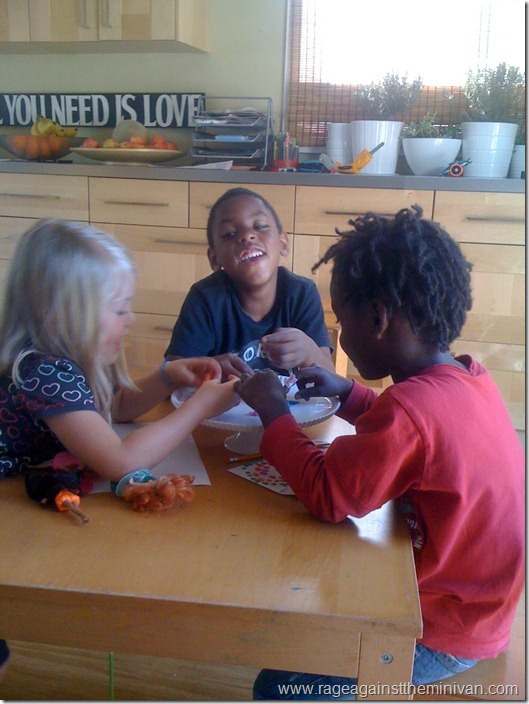I saw a play recently called In Mother Words, and it was a series of vignettes about motherhood. One of the short stories was about a mom who had a biological son and a daughter adopted from China, and she expressed her annoyance at how many people, upon meeting her family, eye her children and ask, “So how do they get along?”  I found this portion of the play (and this character’s sassy response to those questions) particularly hilarious because I get that question all the time. And granted, sometimes that question can just be a normal, small-talk-between-moms question. No problem. But other times, when the question is couched between other nosey questions, like, “Are those all your kids?” and then “So, you adopted AND had your own kids?” in a tone that suggests that this is a mind-blowing concept . . . well then I can tell there more going on than just a simple attempt at chit-chat. I think the world is genuinely curious about how non-biological siblings relate to one another. Perhaps there is an assumption that adoptive families are offering some kind of multi-cultural experiment that we can all learn from. I sometimes feel like the real questions behind these inquiries are:
I found this portion of the play (and this character’s sassy response to those questions) particularly hilarious because I get that question all the time. And granted, sometimes that question can just be a normal, small-talk-between-moms question. No problem. But other times, when the question is couched between other nosey questions, like, “Are those all your kids?” and then “So, you adopted AND had your own kids?” in a tone that suggests that this is a mind-blowing concept . . . well then I can tell there more going on than just a simple attempt at chit-chat. I think the world is genuinely curious about how non-biological siblings relate to one another. Perhaps there is an assumption that adoptive families are offering some kind of multi-cultural experiment that we can all learn from. I sometimes feel like the real questions behind these inquiries are:
Can mixed-race families really get along? and/or Can non-related siblings really act like “real” siblings?
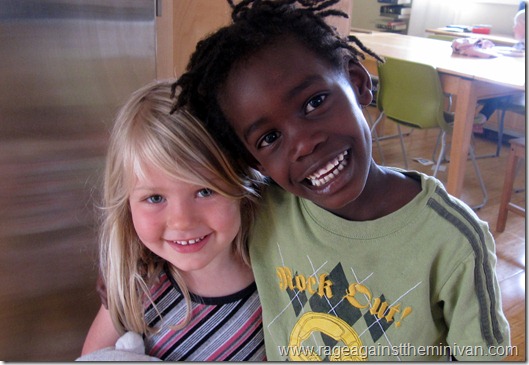 I think these questions say more about society’s baggage about race or biological essentialism than the behavior of my kids do. Because, at least in my family, these factors have very little (if any) effect on the way my kids get along. So, how do they get along? They get along like siblings. Sometimes they adore each other. Sometimes they can’t stand each other. When I started this post, they were blissfully playing “spaceship” on the sofa together. During the time it took to write, I watched three of them fight furiously over two bean bags. Now they are building a fort together. It will probably end with an argument over how many can fit inside without it falling. (Edited to add – it did).
I think these questions say more about society’s baggage about race or biological essentialism than the behavior of my kids do. Because, at least in my family, these factors have very little (if any) effect on the way my kids get along. So, how do they get along? They get along like siblings. Sometimes they adore each other. Sometimes they can’t stand each other. When I started this post, they were blissfully playing “spaceship” on the sofa together. During the time it took to write, I watched three of them fight furiously over two bean bags. Now they are building a fort together. It will probably end with an argument over how many can fit inside without it falling. (Edited to add – it did). 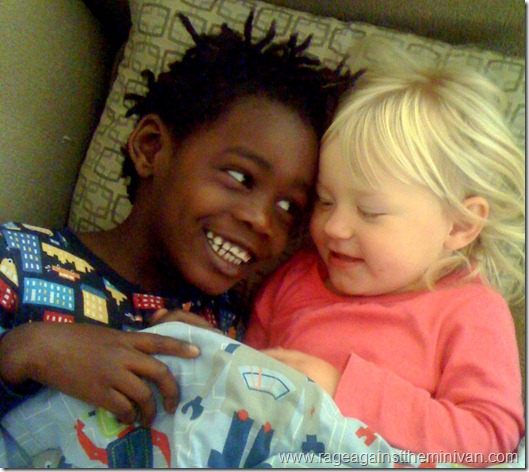 The boys are competitive but they play together the most. Kembe and Karis are the most affectionate with each other. Karis talks about each of her siblings the whole time when they are at school, but she is most excited when Kembe comes home. Jafta and India have an easy relationship and fight the least. The girls love doing girly things together. India and Kembe tell everyone they meet that they are twins. When one kid spends the night at grandma’s, the other three are off and a bit sad for the evening because we aren’t all together. Jafta’s one regret about going to school each day is his fear that his brother and sisters are at home having fun without him.
The boys are competitive but they play together the most. Kembe and Karis are the most affectionate with each other. Karis talks about each of her siblings the whole time when they are at school, but she is most excited when Kembe comes home. Jafta and India have an easy relationship and fight the least. The girls love doing girly things together. India and Kembe tell everyone they meet that they are twins. When one kid spends the night at grandma’s, the other three are off and a bit sad for the evening because we aren’t all together. Jafta’s one regret about going to school each day is his fear that his brother and sisters are at home having fun without him. 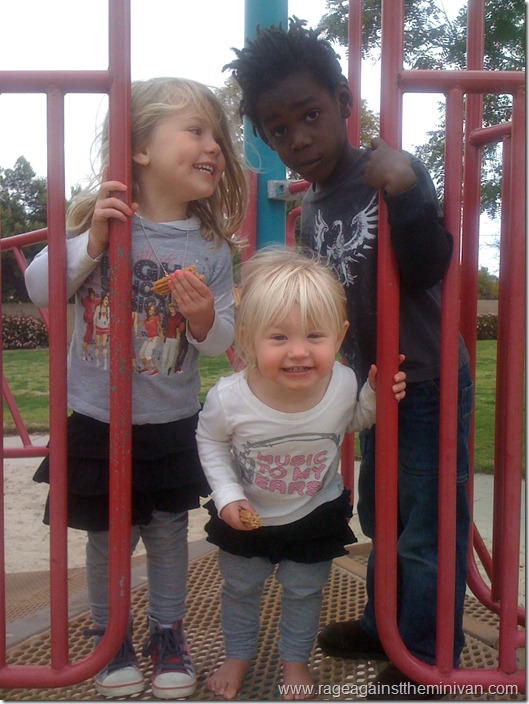 How they get along depends on the time of day, who wants to play what, how flexible they are willing to be with gender-stereotypical play, and how stubborn they are feeling or how well they are sharing. Who is adopted? Who is brown and who is white? I don’t see this effecting any of their interactions.
How they get along depends on the time of day, who wants to play what, how flexible they are willing to be with gender-stereotypical play, and how stubborn they are feeling or how well they are sharing. Who is adopted? Who is brown and who is white? I don’t see this effecting any of their interactions. 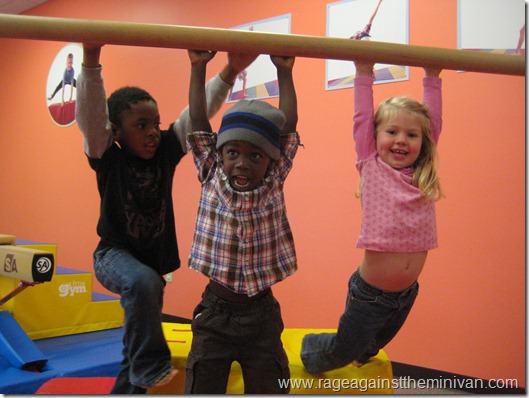 I am proud of how my kids get along. We have worked really hard to teach them respect, generosity, and empathy. We don’t allow tattling. We encourage them to solve problems with each other using feeling words. We model apologizing and forgiveness, over and over. We don’t allow aggression. We supervise closely. I’m glad that the hitting and screaming and punching that was a part of my sibling relationships growing up is mostly absent in our home now. But . . . I don’t think their relationship with each other can be taken as any kind of statement about adoption, or race, or any other sociological ideas. That I’m asked that question by strangers on a regular basis reveals some of the deep ambivalence our nation has about the ability of black people and white people to live in harmony. Yes, that is happening in my house, and in many other mixed-race families across America. But we can’t be held up as a beacon of hope for America’s longstanding race problems. That’s way to simplistic. That hard work still needs to be done on an individual basis, and my kids getting along like siblings cannot be confirmation that racism is over, or that racism is inherent, or whatever hypothesis fuels the questioning. But I think that my new answer to this probing question will be: they get along like brothers and sisters.
I am proud of how my kids get along. We have worked really hard to teach them respect, generosity, and empathy. We don’t allow tattling. We encourage them to solve problems with each other using feeling words. We model apologizing and forgiveness, over and over. We don’t allow aggression. We supervise closely. I’m glad that the hitting and screaming and punching that was a part of my sibling relationships growing up is mostly absent in our home now. But . . . I don’t think their relationship with each other can be taken as any kind of statement about adoption, or race, or any other sociological ideas. That I’m asked that question by strangers on a regular basis reveals some of the deep ambivalence our nation has about the ability of black people and white people to live in harmony. Yes, that is happening in my house, and in many other mixed-race families across America. But we can’t be held up as a beacon of hope for America’s longstanding race problems. That’s way to simplistic. That hard work still needs to be done on an individual basis, and my kids getting along like siblings cannot be confirmation that racism is over, or that racism is inherent, or whatever hypothesis fuels the questioning. But I think that my new answer to this probing question will be: they get along like brothers and sisters. 